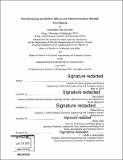Manufacturing variability; effects and characterization through text-mining
Author(s)
Van Grootel, Alexander Willem Anton.
Download1117710080-MIT.pdf (10.30Mb)
Other Contributors
Massachusetts Institute of Technology. Institute for Data, Systems, and Society.
Technology and Policy Program.
Massachusetts Institute of Technology. Department of Electrical Engineering and Computer Science.
Advisor
Elsa Olivetti and Duane Boning.
Terms of use
Metadata
Show full item recordAbstract
Researchers and developers of new materials and processes often underestimate or neglect the effects of manufacturing variability and, as a result, make overly optimistic assumptions about their technologies. In this thesis, I explore the effects of manufacturing variability and find ways to characterize the manufacturing variability of emerging manufacturing processes. I develop a framework that connects manufacturing variability to environmental impact and economic costs through the concept of overdesign. I study examples using this framework and find that around 19% of concrete production is used solely to overcome issues of manufacturing variability, and that reducing the variability when producing fiber composite parts for a Boeing 787 reduces fuel consumption by millions of dollars and saves ktons of CO₂ from entering the atmosphere. I further explore the effects of manufacturing variability by considering its impacts on the commercialization process of new technologies. I consider Additive Manufacturing (AM), a promising technology, and argue that this technology has not reached commercial traction in great part due to our lack of understanding of the uncertainty associated with this process. I draw parallels to fiber composites, which faced similar issues in the 1980s before a collaborative effort, through the Advanced Composite Technology (ACT) and Advanced General Aviation Technology Experiments (AGATE) programs, was able to solve many of these challenges. Finally, I consider the volumes of data available in published documents and analyze whether it is possible to extract this information using text mining techniques, and to use these data to characterize the manufacturing variability of upcoming technologies. Some important challenges obstruct our ability to extract all the important information from these documents, but important steps are made to remove some of these challenges and I demonstrate that useful information can be extracted. Manufacturing engineers view processes as stochastic rather than deterministic. I ultimately argue for this view to also be adopted by environmentalists, materials researchers, and decision makers. I also further develop methods to extract and utilize manufacturing variation information.
Description
Thesis: S.M. in Technology and Policy, Massachusetts Institute of Technology, School of Engineering, Institute for Data, Systems, and Society, 2019 Thesis: S.M., Massachusetts Institute of Technology, Department of Electrical Engineering and Computer Science, 2019 Cataloged from PDF version of thesis. Includes bibliographical references (pages 77-89).
Date issued
2019Department
Massachusetts Institute of Technology. Institute for Data, Systems, and Society; Massachusetts Institute of Technology. Department of Electrical Engineering and Computer Science; Massachusetts Institute of Technology. Engineering Systems Division; Technology and Policy ProgramPublisher
Massachusetts Institute of Technology
Keywords
Institute for Data, Systems, and Society., Technology and Policy Program., Electrical Engineering and Computer Science.